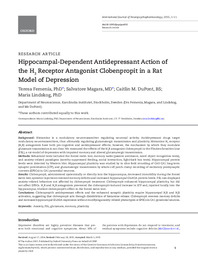Título :
Hippocampal-dependent antidepressant action of the H3 receptor antagonist clobenpropit in a rat model of depression |
Autor :
Femenía Cantó, Teresa
Magara, Salvatore
DuPont, Caitlin M.
Lindskog, Maria |
Editor :
Oxford University Press |
Departamento:
Departamentos de la UMH::Farmacología, Pediatría y Química Orgánica |
URI :
https://hdl.handle.net/11000/35377 |
Resumen :
Background: Histamine is a modulatory neurotransmitter regulating neuronal activity. Antidepressant drugs target
modulatory neurotransmitters, thus ultimately regulating glutamatergic transmission and plasticity. Histamine H3 receptor
(H3R) antagonists have both pro-cognitive and antidepressant effects; however, the mechanism by which they modulate
glutamate transmission is not clear. We measured the effects of the H3R antagonist clobenpropit in the Flinders Sensitive Line
(FSL), a rat model of depression with impaired memory and altered glutamatergic transmission.
Methods: Behavioral tests included the forced swim test, memory tasks (passive avoidance, novel object recognition tests),
and anxiety-related paradigms (novelty suppressed feeding, social interaction, light/dark box tests). Hippocampal protein
levels were detected by Western blot. Hippocampal plasticity was studied by in slice field recording of CA3-CA1 long-term
synaptic potentiation (LTP), and glutamatergic transmission by whole-cell patch clamp recording of excitatory postsynaptic
currents (EPSCs) in CA1 pyramidal neurons.
Results: Clobenpropit, administered systemically or directly into the hippocampus, decreased immobility during the forced
swim test; systemic injections reversed memory deficits and increased hippocampal GluN2A protein levels. FSL rats displayed
anxiety-related behaviors not affected by clobenpropit treatment. Clobenpropit enhanced hippocampal plasticity, but did
not affect EPSCs. H1R and H2R antagonists prevented the clobenpropit-induced increase in LTP and, injected locally into the
hippocampus, blocked clobenpropit’s effect in the forced swim test.
Conclusions: Clobenpropit’s antidepressant effects and the enhanced synaptic plasticity require hippocampal H1R and H2R
activation, suggesting that clobenpropit acts through disinhibition of histamine release. Clobenpropit reverses memory deficits
and increases hippocampal GluN2A expression without modifying anxiety-related phenotypes or EPSCs in CA1 pyramidal neurons.
|
Palabras clave/Materias:
Anxiety
FSL
glutamate
memory
plasticity |
Área de conocimiento :
CDU: Ciencias aplicadas: Medicina: Farmacología. Terapéutica. Toxicología. Radiología |
Tipo de documento :
info:eu-repo/semantics/article |
Derechos de acceso:
info:eu-repo/semantics/openAccess
Attribution-NonCommercial-NoDerivatives 4.0 Internacional |
DOI :
10.1093/ijnp/pyv032 |
Publicado en:
International Journal of Neuropsychopharmacology, 2015;18(9):1 - 111 |
Aparece en las colecciones:
Artículos - Farmacología, Pediatría y Química Orgánica
|

 La licencia se describe como: Atribución-NonComercial-NoDerivada 4.0 Internacional.
La licencia se describe como: Atribución-NonComercial-NoDerivada 4.0 Internacional.
.png)